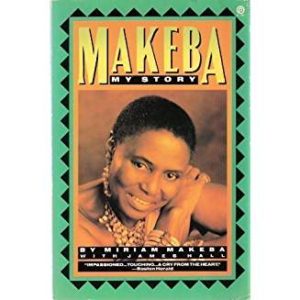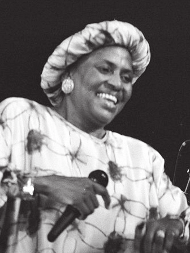My Story
 by Miriam Makeba, James A. Hall, Penguin Books 1988
by Miriam Makeba, James A. Hall, Penguin Books 1988
 Miriam Makeba, nicknamed Mama Africa, was the first modern artist from South Africa to popularize African music in the U.S. and around the world. Internationally, the song that she is remembered for is “Pata Pata”, but in South Africa her most beloved song is “The Click Song”.
Miriam Makeba, nicknamed Mama Africa, was the first modern artist from South Africa to popularize African music in the U.S. and around the world. Internationally, the song that she is remembered for is “Pata Pata”, but in South Africa her most beloved song is “The Click Song”.
With the help of freelance writer Hall, the well-known South African singer tells the story of her life from 1932 onward. Daughter of a Xhosa father and a Swazi mother, she experienced many of the injustices of apartheid. As a young girl of thirteen, she entered a talent show at a missionary school and walked off with the first prize. She was often invited to sing at weddings, and her popularity grew in leaps and bounds as more and more people became dazzled by her talent. Miriam Makeba captured international attention with her role in Come Back, Africa, an anti-apartheid film released in 1959. Following the film’s showing at the Venice Film Festival, Makeba met American entertainer and activist Harry Belafonte. Impressed with her unique renderings of native folksongs, he served as her mentor and promoter in the United States. He arranged gigs for her in New York City clubs and a guest spot on The Steve Allen Show. The exposure launched an exceptional musical career. She did an album together with her mentor, “An Evening with Harry Belafonte [&] Miriam Makeba,” for which she won a Grammy Award.
The 1960s proved to be an tumultuous decade for Makeba. Her opposition to apartheid politics in South Africa set the stage for harsh government retaliation. Her recordings were subsequently banned in South Africa. When she tried to return to her native land for her mother’s funeral, her passport was revoked by the government of Pretoria. More than three decades of exile began for the singer.
There are both joyful and painful accounts of her four marriages. Makeba had two failed marriages in the 1960s. The biggest blow to her career came with her marriage to American Stokely Carmichael (Kwame Toure), a radical black activist. The “Black Power” movement was regarded as threatening by mainstream American society. Once again, Makeba faced the devastating effects of political engagement. She recalled the curtailment of her success in the United States: “My concerts are being cancelled left and right. I learn that people are afraid that my shows will finance radical activities. I can only shake my head. What does Stokely have to do with my singing?”
Makeba moved with Stokeley to Guinea, where she was well-respected by the government. She became Guinean ambassador to the United Nations. But it wouldn’t be until 1990 that she could return to South Africa. It was the year of Nelson Mandela’s release. Her first concert in her home country after her exile was a huge success and led to a world-wide tour with singers such as Paul Simon, Nina Simone and Dizzy Gillespie. She received many awards, not only for her many albums but also for her political engagement. She never considered herself a politican, but always an activist for human rights.
“Makeba – My Story” has been translated from English into many other languages, such as German, French, Dutch, Italian and Spanish. Her autobiography was even released in Japan in 1994.
Novels and Autobiographies
African Traditional Life
Amkoullel, A Fula Child
Autobiographies
Aké. The Years of Childhood
Dreams in a Time of War
Facing the Lion: Growing Up Maasai on the African Savanna
Long Walk to Freedom
My Story
Unbowed: A Memoir
Coming of Age
Mandela’s Ego
Miriam's Song
Nervous Conditions
Purple Hibiscus
The Mending Season
Emigration
Lessons in Humanity
A Long Way Gone. Memoirs of a boy soldier
Child Soldier: Fighting for my life
I die, but my Memory lives on
Praise Song
Sozaboy
Stories about Friendship



